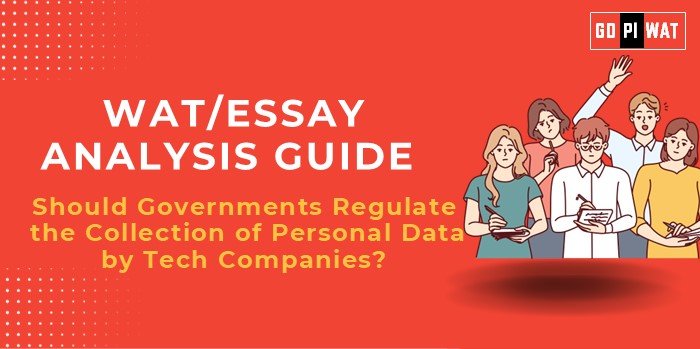📋 WAT/Essay Analysis Guide
📂 Should Governments Regulate the Collection of Personal Data by Tech Companies?
🌐 Understanding the Topic’s Importance
The topic intersects with economic, legal, and ethical dimensions, making it a critical area for B-school students aiming to work in technology, policy, or strategy.
🕒 Effective Planning and Writing
- Time Allocation:
- Planning: 5 minutes
- Writing: 20 minutes
- Review: 5 minutes
- Preparation Tips: Note key statistics, landmark regulations (e.g., GDPR), and recent developments.
✍️ Introduction Techniques for Essays
- Contrast Approach: “While data powers innovation in healthcare and finance, unregulated collection has also enabled large-scale breaches like Equifax.”
- Solution-Based: “The debate isn’t whether governments should regulate data collection, but how to strike the balance between security and innovation.”
- Timeline: “From the GDPR in 2018 to India’s Data Protection Act in 2023, regulation has been a growing trend in tech governance.”
📚 Structuring the Essay Body
- Achievements:
- Highlight GDPR’s global influence and rising consumer awareness.
- Challenges:
- Discuss fragmented laws, implementation issues, and monopolistic practices.
- Future Outlook:
- Emphasize global frameworks and public-private collaboration.
🔗 Concluding Effectively
- Balanced Perspective: “Government regulation must be adaptive to safeguard privacy while promoting innovation in a data-driven economy.”
- Global Comparison: “Countries adopting GDPR-like frameworks balance economic growth with user protection better than those without regulations.”
📄 Sample Short Essays
- Balanced Perspective: “Personal data collection is both a tool for innovation and a source of ethical dilemmas. Regulation by governments can mitigate risks but must avoid stifling progress.”
- Solution-Oriented: “A middle-ground approach combining strict penalties for breaches and flexible compliance mechanisms will best serve all stakeholders.”
- Global Comparison: “The EU’s GDPR and California’s CCPA set examples of balancing innovation with privacy. A global standard could resolve fragmentation challenges.”


